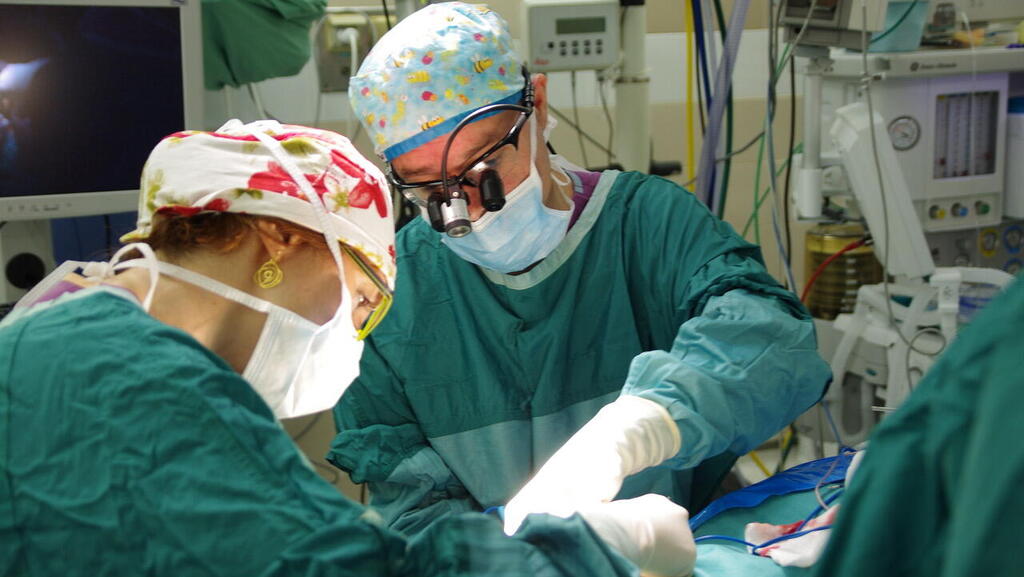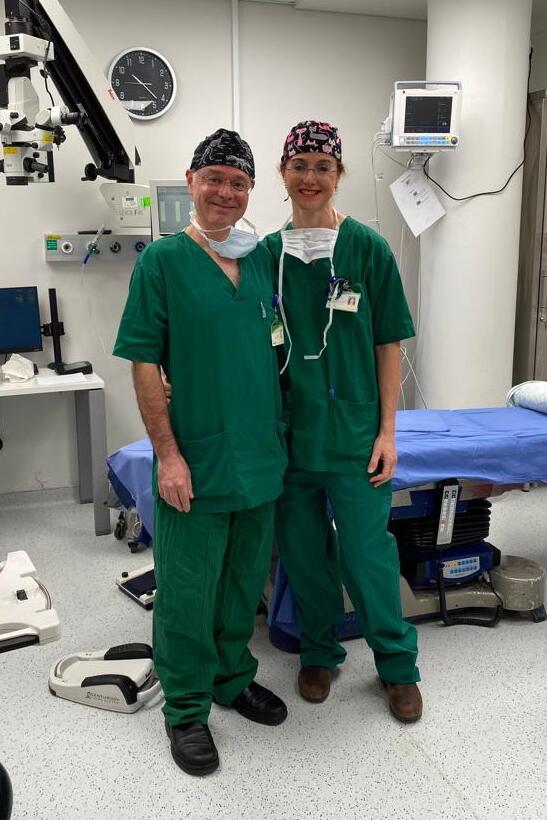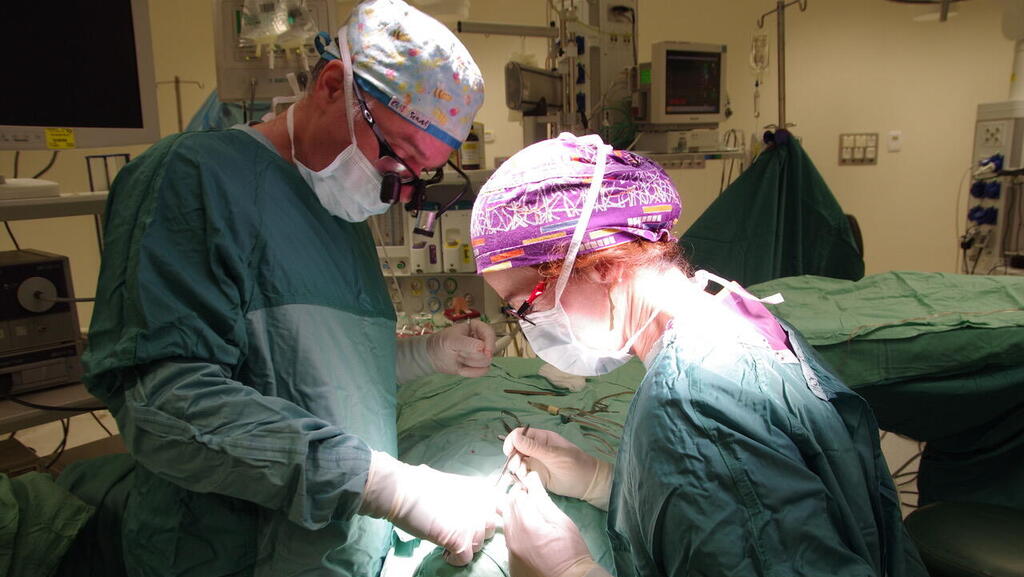When Dr. Nili and Dr. Avichai Segal met on the first day of medical school, they never imagined how deeply intertwined their personal and professional lives would become. Today, the couple, both senior surgeons at Assuta Beersheba, speak with Ynet about operating side by side, raising a family amid demanding schedules, and the reactions they get from patients: “People say they’re getting two birds with one stone.”
Married couples often share a home, children, a bank account, and sometimes a dog. But Dr. Nili and Dr. Avichai Segal also share an operating room. Well, at least when necessary. The couple from the small southern community of Shima in the Hebron Hills aren’t just top specialists in their fields—ENT and ophthalmic surgery at Assuta Beersheba—but also full partners in life. Each morning, they commute together to the clinic or hospital, where they perform surgeries, consult on complex medical cases, and at the end of their shifts, head home to their other full-time job: parenting.
“We met on the first day of school,” Avichai recalls. “We sat together in the lecture hall, started talking, and the rest is history.” Since then, their professional paths have largely run parallel: studying medicine through the IDF academic program, serving as army doctors in various roles, and later completing residencies at Soroka Medical Center, each in their respective specialties. After residency, both began performing surgeries at Assuta Beersheba, where their real professional partnership began.
“I specialize in eye surgery and a field called oculoplastics, which deals with eyelids, the eye socket, and tear ducts. Nili focuses on rhinology—surgeries of the nose and sinuses,” explains Avichai. “These areas overlap—there are shared concerns like tear ducts, tumors, or other conditions that require joint intervention. We often consult each other and perform combined surgeries. A lot of our dinner conversations end up being professional.”
What does a 'professional' dinner conversation look like?
Avichai: “We talk about interesting cases we saw—someone with a rare condition. What should we do? What tests are needed? What’s the best surgical approach?”
So work doesn’t exactly stay at the hospital.
Nili: “No, definitely not.”
No disagreements in the OR
A married couple working as surgeons is rare, and comes with its perks. “It’s nice to work with someone you know deeply and can trust 100 percent—someone who’ll give you the best answer,” says Avichai. “It was like that during our residency at Soroka and even now that we’re more independent.”
Patients, too, often react positively to their teamwork. “People who come to our clinic are really happy—they feel like they’re getting two birds with one stone,” Avichai says with a smile. “We get a lot of feedback like, ‘I saw your wife—she gave great care.’” Nili nods in agreement: “Very positive reactions.”
Their collaboration is more than just a concept—it’s part of their daily routine. “We’ve had cases like tumors and complex eye socket surgeries that we did together,” Avichai shares. “Usually, each of us operates in our own specialty, but sometimes we’re in the same OR. Even before surgery, we go over imaging together, plan what we want to do, and it flows naturally from there.”
Despite the high-stakes nature of their work, disagreements, they say, are rare and always professional. “Each of us says what we think, then we make a decision,” says Avichai. “It never turns into extreme disagreements. There’s no ego. There’s always discussion, and we come to an agreement.” Nili adds: “What matters most is what’s right for the patient. It’s all about professionalism.”
Coordinating life in and out of the OR
Working so closely might sound harmonious, but behind the scenes, it takes serious coordination, sacrifice, and planning. “It’s not easy,” Nili admits. “Residency and the years after—working in hospitals and as surgeons—it’s a huge time commitment. The hours are intense, there are night shifts, weekends, and holidays. It’s tough on the family.”
“We have two kids—a boy and a girl,” Avichai adds. “People ask them if Dad’s working, and they say, ‘He’s on call.’ We constantly have to coordinate even the simplest things. When they were younger, just getting them to daycare or activities required help from the grandparents. Vacation planning has to be very precise. There’s no such thing as spontaneous plans. But both our specialties are fascinating and definitely worth the long-term effort.”
Medicine runs in the family
The demanding lifestyle may have taken its toll, but it also left an impression. Their daughter Galia, who grew up around dinner-table discussions about surgeries and diagnoses, has chosen to follow in her parents’ footsteps—despite showing little interest early on.
Get the Ynetnews app on your smartphone: Google Play: https://bit.ly/4eJ37pE | Apple App Store: https://bit.ly/3ZL7iNv
“When the kids were younger, they’d joke about the medical terms we used, and neither showed much interest in the field,” Avichai recalls. “We didn’t push them—everyone chooses their own path. But during our daughter’s military service, when she worked with soldiers in a medical setting, she realized this might be her calling. Today she’s finishing medical school at the Technion in a dual degree with biomedical engineering.”
“She was a combat fitness instructor in the Duvdevan unit,” Nili adds, “and during a course on injuries and physiotherapy, something clicked.”
A mission for the south
Beyond their family and surgical work, the Segals see themselves as emissaries of sorts—dedicated to improving medical care in the country’s periphery. They’re especially looking forward to the upcoming opening of Assuta’s new hospital building in Beersheba.
“The new center is expected to significantly improve health care in the south and throughout the periphery,” says Nili. “We’re really excited about it and hope it’ll be a real game-changer for an area that desperately needs better access to medicine, just like anywhere else in Israel.”
Their commitment to the south is more than words—it’s evident on the ground, especially during times of conflict.
“Our clinic in Beersheba stayed open throughout the war,” Nili says. “It was open to everyone—soldiers, civilians, whoever needed care. We treated many service members stationed in the area.”
“A lot of our patients are from this region,” Avichai adds.
“Even the ones we operate on,” Nili continues. “These are people who live here—it’s always close to home.”





